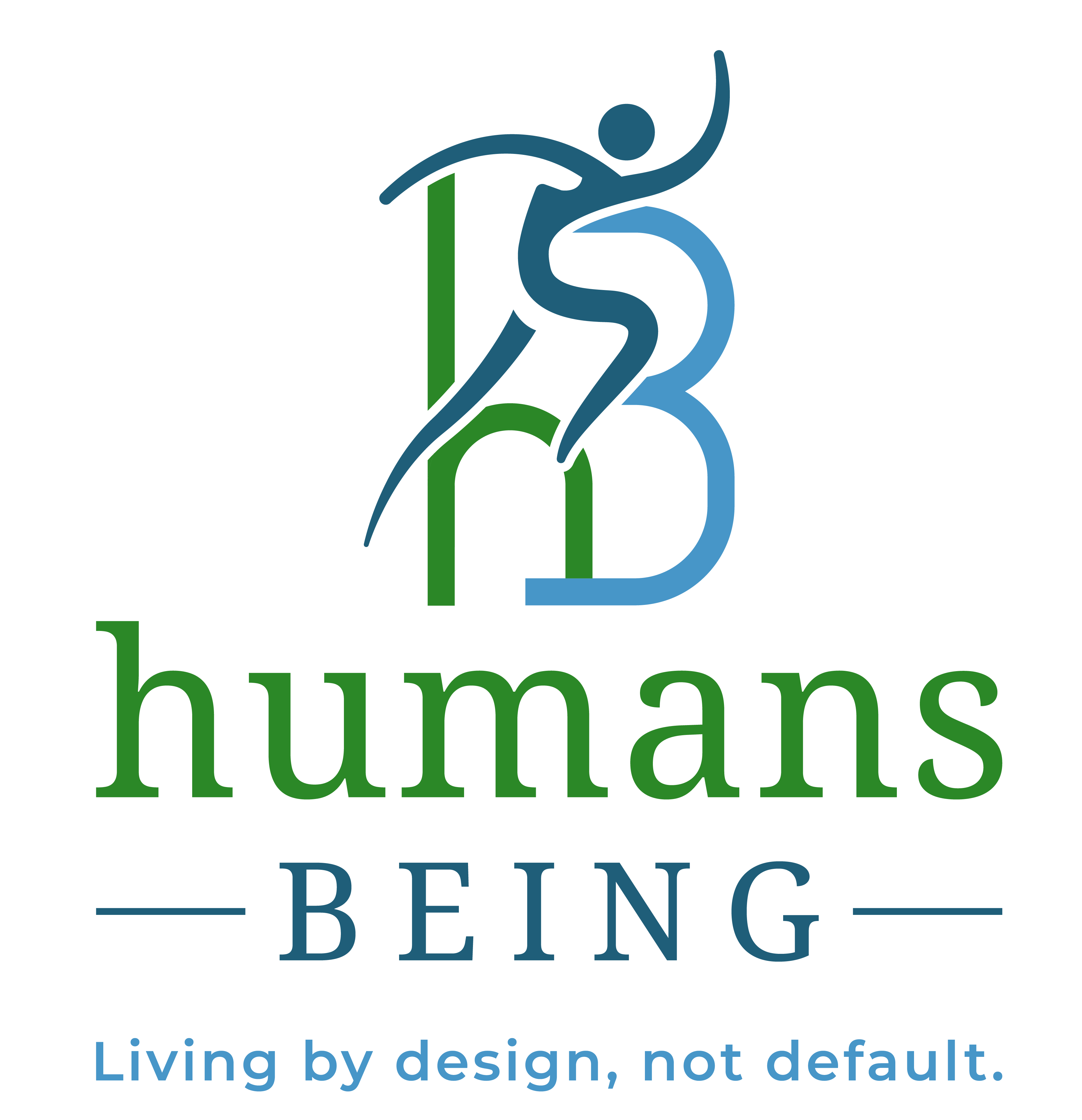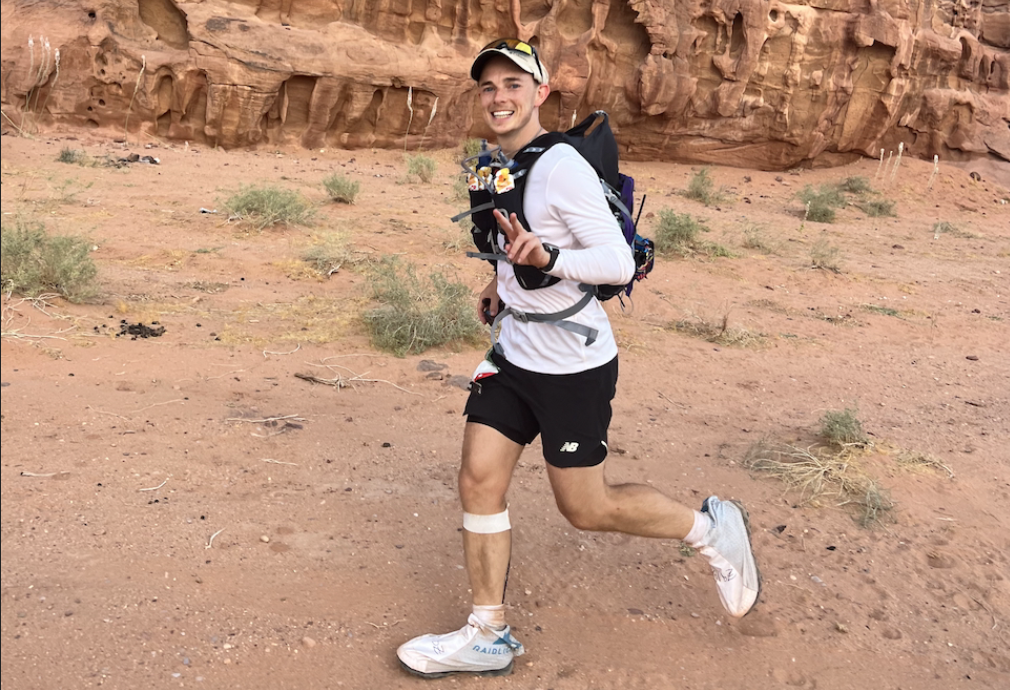Daily Habit 3. Thinking vs BEING.
Oct 04, 2025 10:23 am
Hey , how's it going?
Hopefully you've been hydrating better and sleeping more.
humans BEING emphasises that second word.
Being.
To be or - in most cases, for much of the time - not to be.
This email is about presence. BEING present. And how thinking can get in the way.
1. Thinking defines us.
We're Human Beings. We're Homo Sapiens.
Distinguishing us from our extinct cousins: Homo Erectus and Homo Neanderthalensis, "Sapiens" means 'Smart" or "Thinking".
Our thinking brains have always been our defining feature.
They evolved to give us tool use, fire, communication of ideas/memes, and the ability to understand the past and future.
With our brains. We outcompeted our cousins.
And we dominated the world.
But our brains are a huge vulnerability too.
2. The problem with our brains.
Our brains take up 2% of our body weight. Yet they require 20% of our daily energy.
The squishy mass of fat and protein is always on.
Always thinking.
Brains are great at solving challenges.
But they'll also haunt us if there's no challenge to solve.
We needed our brains to worry about wolf attacks, fighting frosts and famine, remembering where we saw running water.
Now, at 3am, they wake us up to remind us of an email we didn't send.
Our pre-frontal cortex is so advanced we can see and feel and hurt from scenarios that haven't happened.
Fact. You release more stress hormone (cortisol) thinking about skydiving compared to actually jumping out the plane.
Now that we live such sheltered lives,
Now that we rely on our brains more than our bodies for work,
Now that we drip feed negative news, ideas and cultural cues into our brains at every spare second,
Our brains will literally be the death of us.
Fact. The biggest killer of men under 50 is themselves. Not smoking, not heart attacks, not dangerous careers, not even other people.
Our incredibly creative brains are becoming our biggest downfall.
And the main problem is that they take us everywhere except now
3. Why presence matters.
"Now is the only place we can exist in."
"Where are you right now?"
This sounds obvious, but it really isn't.
Read it again.
"Now is the only place we can exist in."
I'd pay someone to follow me round all day saying this whenever I look distant.
We're the only species to think about the future and the past.
Ask a bird, a tree, a fish what time it is, they'd say "NOW, it's always now."
It's now.
Yet, we are almost never here.
A third of you reading this right now are probably skimming the words whilst thinking about what's for lunch.
And this sucks.
Because we're missing the most important moments.
We're on a holiday we've waited for all winter and our mind is wandering how a sport's team is doing, or preparing for a tough conversation at work next week, or what someone who might see our post might think about it.
Maybe even that time we called a teacher "Dad" in Year 4.
And this is a big problem.
Not just because we're missing things that are right there.
But because it's impacting our mental health.
Not paying attention to reality is not living in reality.
In Scott Peck's incredible book The Road Less Travelled he states that:
“Mental health is an ongoing process of dedication to reality at all costs.”
In other words, a poor mental health is an avoidance of what's really going on.
In most instances; your internal world is a reflection of your external world.
Ignoring it makes the problem worse.
Like ignoring a painful ankle will eventually lead to worse damage.
And how can you see reality if you're never present?
4. It's never been easier to avoid reality.
Briefly compare your life to that of an 8th century peasant.
Aside from all the ENDLESS privileges now: access to healthcare, food, shelter, education, rights, egalitarianism, etc - one of the most drastic differences is noise.
A peasant would wake, clean, cook, work in silence.
Mostly illiterate, they can't even escape into a nice fictional Hogwarts before bed.
It's just conversation and maybe listening to a fiddle in the local alehouse on a Saturday night.
We'd call this 'raw-dogging' now.
That used to be life.
Compare that to 2025: Your attention is the main commodity.
Meaning we've accidentally given it away (often deliberately, often for a fee).
Companies are spending billions to make living outside of your mind the most fun place to be. They're doing a great job.
Airpods, podcasts, Youtube, TikTok, tube billboards, bus adverts.
You can, and do give them your attention.
5. Avoidance = loss.
Your mind is your only vehicle. Trust me. You should look after it.
Smash your brain into some pavement and you realise how much you miss it working well.
Whilst it takes effort to practice presence -
Whilst it takes courage to try -
- You cannot have a healthy mind if you're not ever brave enough to be in it.
You must tend to the garden to enjoy living in it.
We're living in a mental health crisis and no wonder.
No one is mowing the lawn!
The lights are on, but no one's home.
4 hours of screen time per day = 1/4 of your waking day.
That's 2+ days of your week.
(To stress: I'm not pretending I'm some phone-free saint writing this from a treehouse on a typewriter.
These emails are for me to read too!)
In The Power of Now, Eckhart Tolle reminds us that thinking is not the same as being present.
In fact they're opposites.
This is a huge distinction - you might do well to really consider this.
He writes:
"Time is an illusion. It is not the present that is the problem, but your thoughts about the past and future"
Presence (being) is time-less.
We're present (and happiest) when we aren't aware of time at all.
The NOW might look like:
- Zooming down a ski slope,
- On someone's shoulders at a music concert,
- Sharing a pot of tea in a garden,
- Lying in someone's arms in the early hours of the morning,
- Watching a V of geese flying over a frosty park.
We should learn to think less, and BE more.
To calm our brain, to hear it, but not listen to it.
There's two times we often practice this.
In the shower, and driving.
They're the last bastions of distraction free presence.
Most people love that time.
But even they're being lost to waterproof speakers and CarPlay.
(PS: If you're not able to 'raw-dog' a car drive/shower without music, you're probably the person in most need of it!)
6. The solution: Practice presence.
We must make time to be present.
We must listen to our minds, to hear them.
We must pay attention to reality, to fix the real-life problems.
We don't have to take our mind seriously.
In fact - that's the purpose of meditation.
But we need to tend to our garden.
Or else the weeds will be all that's left.
HABIT 3: Find 3 minutes a day to be in your mind.
Just 3 mins.
Sit still.
Close your eyes.
Listen.
Breathe.
BE.
Let your thoughts come and go, without judgement, just like your breath.
In doing so, you'll make your mind a place you enjoy being in.
Where the fuck else would you want to be? 😉
Stay intentional.
Own the word BEING.
Discard the word Sapien.
Cheers
James
PS: It's going to be easy to read this email and go 'ahh yeah, I'll keep that in mind and just keep the radio off tomorrow in the car.'
That's not enough, and I know you'll forget in 2 days.
Really try this.
Sit on the end of your bed first thing or last thing.
Make it a routine, just for 7 days.
Found this useful?
Or want to learn how to apply these tools to your own routines?
→Book an Exploration Call (30 min call)
Disclaimer:The information I share is for education and general interest only. It is not medical advice, diagnosis, treatment, or a substitute for professional care. Please do not start or stop any medication or supplement without guidance from a qualified health professional who knows your personal history.
The views expressed are my own, based on sources available at the time of writing. Logos, images, and short excerpts may appear for identification, critique, or educational purposes; all trademarks and copyrights remain with their owners. I aim to be accurate, and if you believe something here is incorrect, please let me know so I can review and, if needed, correct it.


